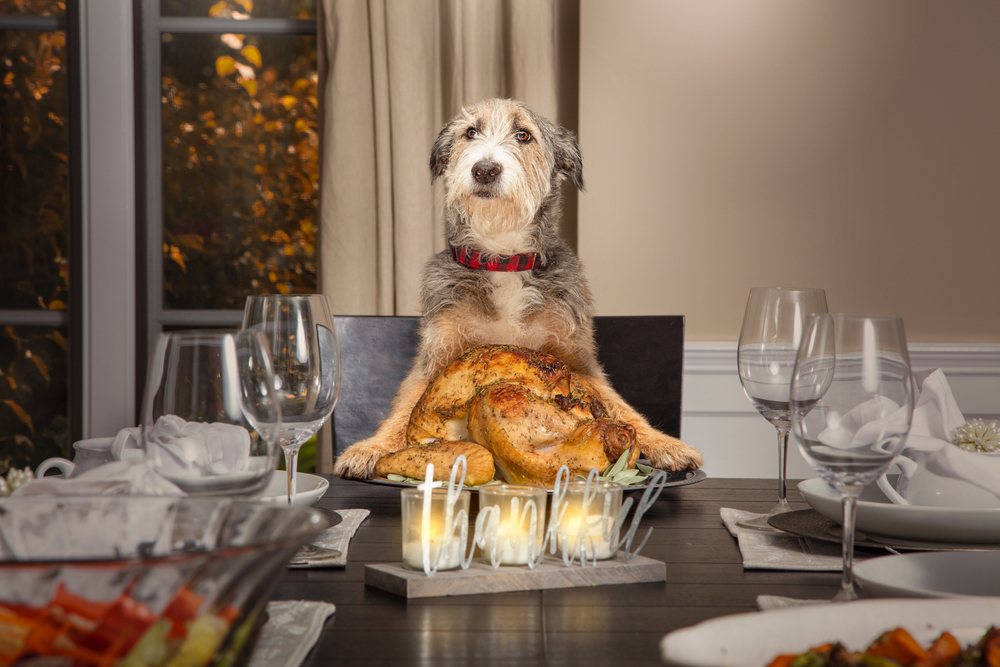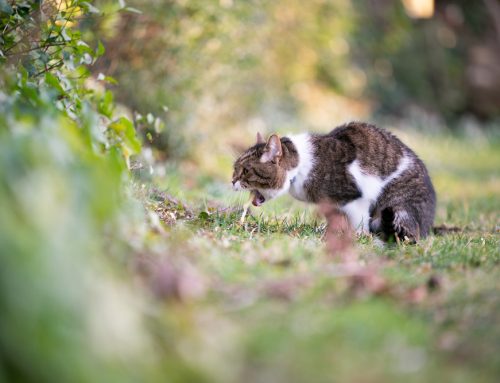The holiday season is a fun and festive time, but the celebratory setting can endanger your pet if you don’t take certain precautions. Our Tamberly Animal Hospital team wants to help by offering tips to protect your pet during the holiday season.
#1: Keep your pet secure during holiday celebrations
Many pets are upset by crowds and strangers in their home, and often find an opportunity to escape to a less stressful environment. But, no one wants to lose their pet, especially during the holidays, so follow these tips to keep them secure:
- Check your pet’s collar and tags — Ensure your pet wears a snug-fitting collar and identification tags with your current contact information.
- Microchip your pet — Microchipping your pet provides permanent identification that cannot be lost or removed, but you must keep your contact information updated in the microchip registry, so you can be informed if your pet is found.
- Create a pet safe zone — Confine your pet to a quiet area in your home during the holiday celebration to ensure they don’t escape and to help relieve their stress. Provide their essentials, including soft bedding and a food-puzzle toy, and leave music playing to mask party noise.
#2: Protect your pet from the Christmas tree
Many pets are intrigued by the Christmas tree and cannot resist investigating the interesting home addition. However, the Christmas tree poses many dangers for your pet. Tips to protect your pet include:
- Anchor your Christmas tree — Securely anchor your Christmas tree by using a stable tree stand and tying the tree’s top or sides to a hook in the ceiling or an adjacent wall. This will help prevent the tree from falling if your cat attempts to climb the branches or your dog’s wagging tail gets too close.
- Block off the base — Many pets like to drink from a new water source, but the tree water can cause stomach upset. Block the tree base to prevent your pet from drinking the water.
- Use cord covers — If your pet tends to chew electrical cords, make cords less accessible with covers and cord organizers.
- Place ornaments strategically — Some ornaments can be broken, resulting in shards that can injure your pet. Place fragile ornaments high on the Christmas tree, and consider leaving the lower branches undecorated if your pet is especially curious.
- Avoid tinsel — Cats are usually attracted to this sparkly, string-like decoration, but ingested tinsel can cause a linear intestinal blockage and result in an intestinal perforation.
#3: Prevent your pet from eating holiday food
Any sudden change in your pet’s diet can result in gastrointestinal (GI) upset, and fatty foods commonly found at a holiday feast can trigger a potentially life-threatening condition called pancreatitis. Other dangerous foods include:
- Bones — Cooked bones become brittle and can splinter, damaging your pet’s mouth or GI tract.
- Unbaked yeast dough — If your pet ingests unbaked yeast dough, the expanding dough can cause bloat, which can lead to a life-threatening condition called gastric dilatation-volvulus (GDV). In addition, the fermentation process produces alcohol, which can enter your pet’s bloodstream and cause alcohol poisoning.
- Chocolate — Chocolate contains ingredients that stimulate a pet’s central nervous system, causing signs that include agitation, excessive panting, increased heart rate, and seizures.
- Grapes — Grapes, raisins, and currants can cause severe kidney failure in pets.
#4: Ensure your pet cannot access your guests’ belongings
Most pets are curious and want to investigate guests’ bags, purses, and coats. However, many people keep items that are dangerous to pets, including:
- Xylitol — Xylitol is a sugar substitute commonly found in sugar free gum and mints that can cause significant hypoglycemia in pets. Signs include vomiting, weakness, incoordination, and seizures.
- Ibuprofen — Ibuprofen is a non-steroidal anti-inflammatory that many people keep on hand for headaches, but the drug can cause gastrointestinal ulceration and kidney damage in pets. Signs include vomiting blood, diarrhea, abdominal pain, dark tarry stools, and depression.
- Acetaminophen — This commonly used pain medication can cause liver disease in pets, with cats especially susceptible. Signs include inappetence, lethargy, vomiting, and respiratory distress.
#5: Choose pet safe holiday decorations
When decking your halls, keep your pet’s safety in mind. Considerations include:
- Small objects — Pets frequently investigate the world with their mouth, and may swallow a small object that can lead to a GI obstruction.
- Candles — Lit candles can cause a fire if knocked over by your inquisitive pet.
- Holiday plants — Several holiday plants, such as amaryllis, chrysanthemums, holly, lilies, and mistletoe, are toxic to pets. Ensure any decorative plants you use are pet safe.
#6: Keep your pet stress free during the holiday celebration

Many pets are stressed or frightened by fireworks. Take the following steps to help reduce your pet’s stress or fear during a fireworks display:
- Acclimate them to the noise — Before the holiday season, acclimate your pet to fireworks noise by:
-
- Playing a fireworks recording for your pet at a low level while they are eating or playing.
- Gradually increasing the volume over several sessions.
- Immediately reducing the volume if your pet becomes upset, and starting from the safe volume at the next session.
- Seek veterinary assistance — If your pet experiences significant anxiety during a fireworks display, ask our veterinary team if your pet is a good candidate for an anti-anxiety medication or supplement.
Following these tips should help keep your pet safe this holiday season. If you think an anti-anxiety medication or supplement could benefit your pet, contact our Tamberly Animal Hospital team, so we can ensure they stay as stress free as possible during the holiday celebrations.







Leave A Comment